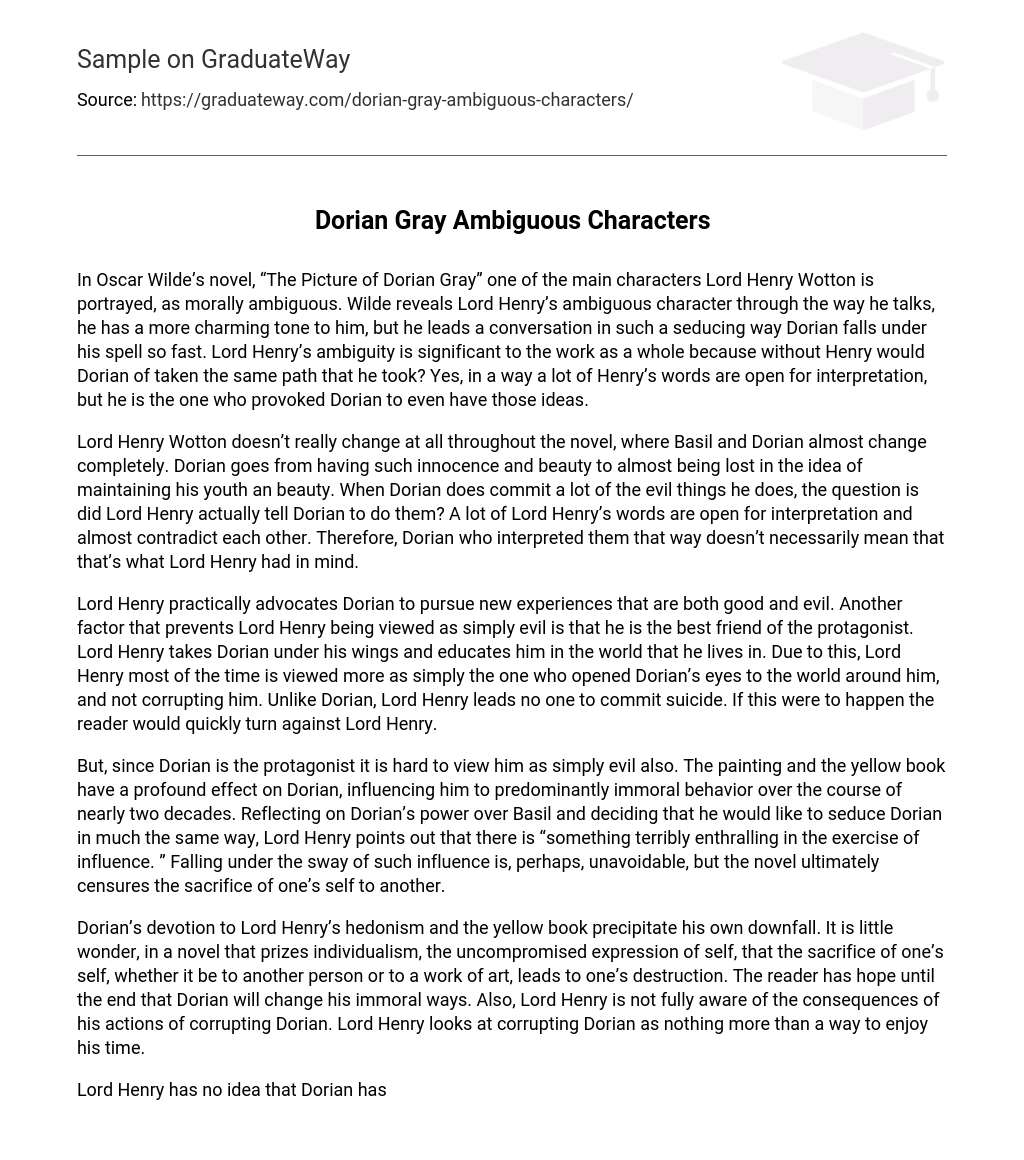In Oscar Wilde’s novel, “The Picture of Dorian Gray” one of the main characters Lord Henry Wotton is portrayed, as morally ambiguous. Wilde reveals Lord Henry’s ambiguous character through the way he talks, he has a more charming tone to him, but he leads a conversation in such a seducing way Dorian falls under his spell so fast. Lord Henry’s ambiguity is significant to the work as a whole because without Henry would Dorian of taken the same path that he took? Yes, in a way a lot of Henry’s words are open for interpretation, but he is the one who provoked Dorian to even have those ideas.
Lord Henry Wotton doesn’t really change at all throughout the novel, where Basil and Dorian almost change completely. Dorian goes from having such innocence and beauty to almost being lost in the idea of maintaining his youth an beauty. When Dorian does commit a lot of the evil things he does, the question is did Lord Henry actually tell Dorian to do them? A lot of Lord Henry’s words are open for interpretation and almost contradict each other. Therefore, Dorian who interpreted them that way doesn’t necessarily mean that that’s what Lord Henry had in mind.
Lord Henry practically advocates Dorian to pursue new experiences that are both good and evil. Another factor that prevents Lord Henry being viewed as simply evil is that he is the best friend of the protagonist. Lord Henry takes Dorian under his wings and educates him in the world that he lives in. Due to this, Lord Henry most of the time is viewed more as simply the one who opened Dorian’s eyes to the world around him, and not corrupting him. Unlike Dorian, Lord Henry leads no one to commit suicide. If this were to happen the reader would quickly turn against Lord Henry.
But, since Dorian is the protagonist it is hard to view him as simply evil also. The painting and the yellow book have a profound effect on Dorian, influencing him to predominantly immoral behavior over the course of nearly two decades. Reflecting on Dorian’s power over Basil and deciding that he would like to seduce Dorian in much the same way, Lord Henry points out that there is “something terribly enthralling in the exercise of influence. ” Falling under the sway of such influence is, perhaps, unavoidable, but the novel ultimately censures the sacrifice of one’s self to another.
Dorian’s devotion to Lord Henry’s hedonism and the yellow book precipitate his own downfall. It is little wonder, in a novel that prizes individualism, the uncompromised expression of self, that the sacrifice of one’s self, whether it be to another person or to a work of art, leads to one’s destruction. The reader has hope until the end that Dorian will change his immoral ways. Also, Lord Henry is not fully aware of the consequences of his actions of corrupting Dorian. Lord Henry looks at corrupting Dorian as nothing more than a way to enjoy his time.
Lord Henry has no idea that Dorian has murdered anyone, or caused anyone other than Sybal Vane to commit suicide. As shown in the book when Lord Henry tells Dorian that there is no way he could commit murder because he is much too good and noble for that. As shown by this essay, Lord Henry is completely morally ambiguous! He never directly once influences Dorian to kill anyone, he just simply opened his eyes up to the world around him. He gave Dorian his advice and Dorian may or may not have interpreted it the way that Lord Henry intended, but without the influence of Lord Henry this novel could have took a whole other path.





